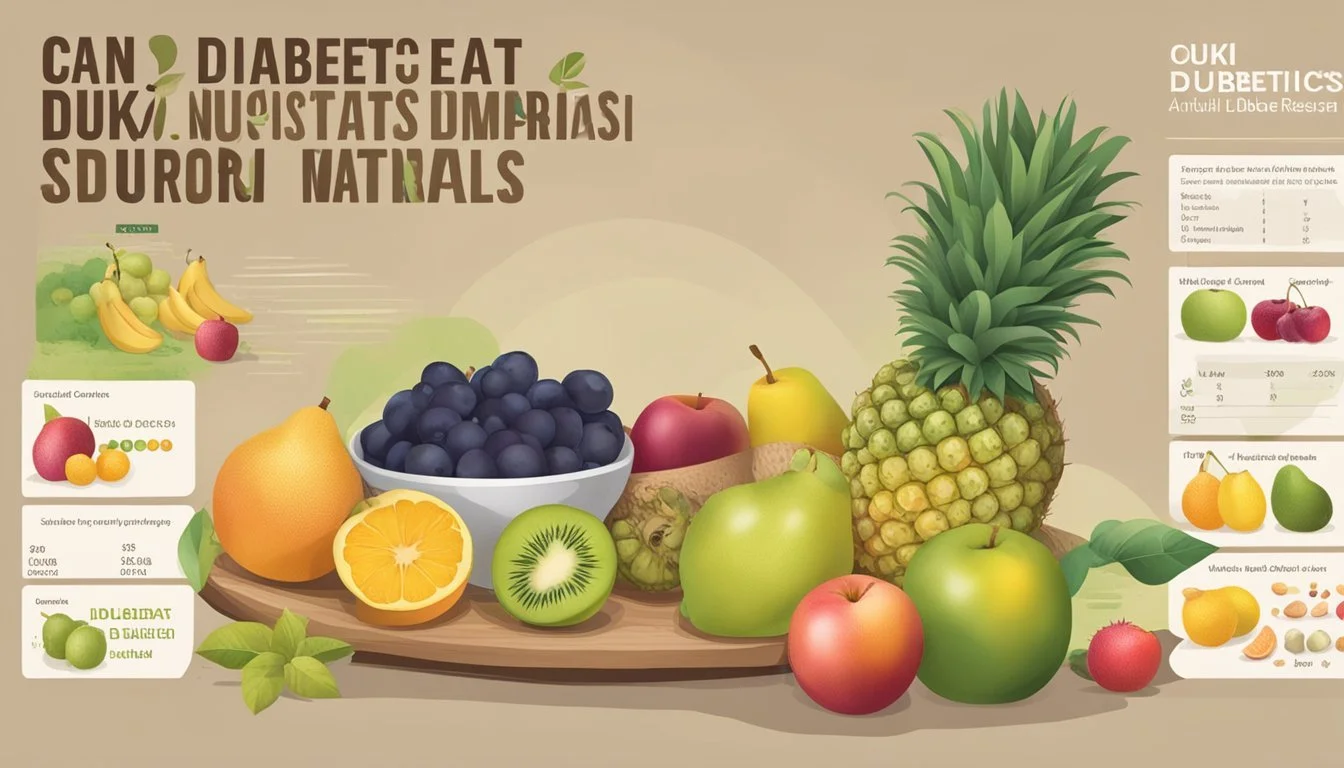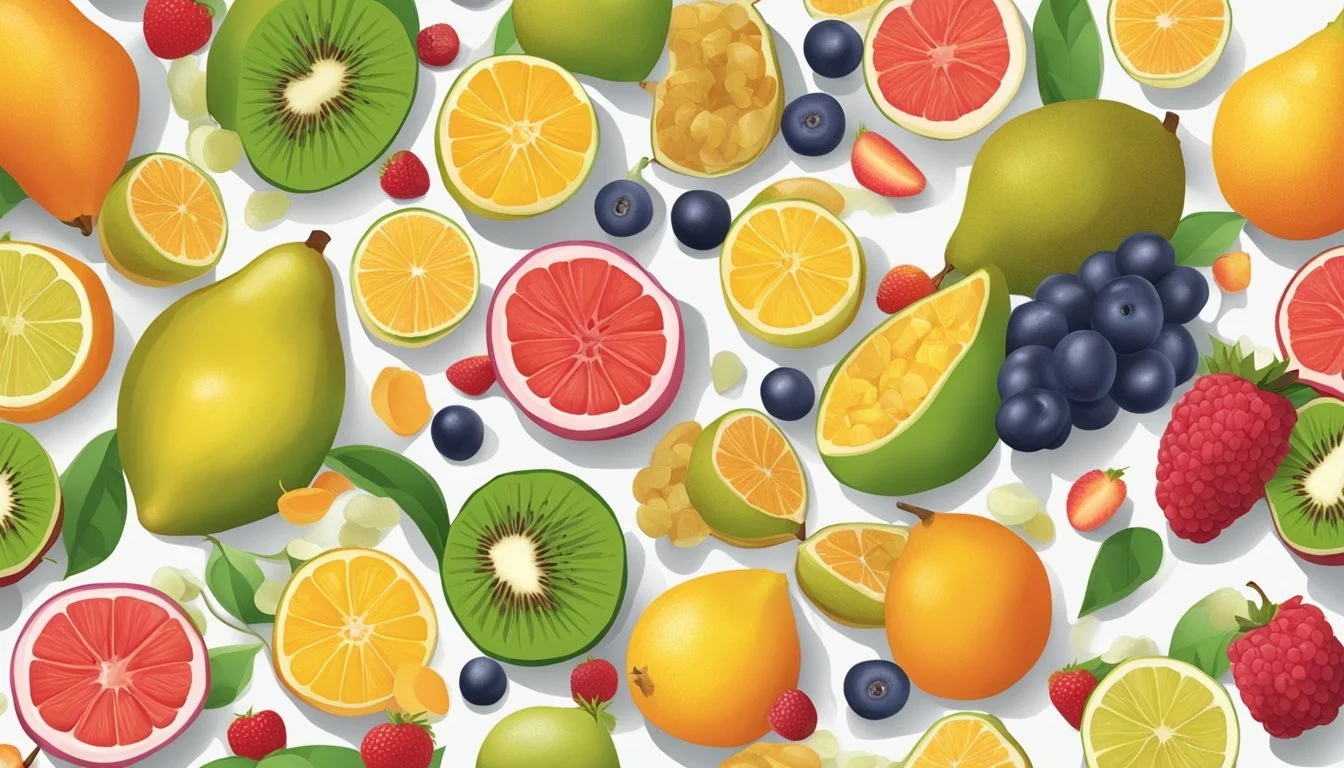Can Diabetics Eat Duku?
Exploring Health Benefits and Risks
For individuals managing diabetes, understanding which fruits can fit into their dietary plan is crucial. Duku, also known as langsat, is a tropical fruit that might come under consideration. This small, sweet fruit not only offers a delectable taste but also carries nutritional benefits including vitamins and fiber.
Yes, diabetics can eat duku in moderation, ensuring it fits within their carbohydrate budget. It's important to monitor the portion size to maintain balanced blood sugar levels. Always account for duku as part of your total carbohydrate intake to avoid unexpected spikes.
For those seeking to diversify their fruit intake while managing diabetes, duku can be a delightful option. Like other fruits, duku should be part of a controlled and mindful eating plan. Consulting with healthcare providers can provide personalized insights into incorporating duku and other fruits effectively.
Understanding Diabetes
Diabetes is a chronic condition characterized by high blood sugar levels due to the body's inability to produce or effectively use insulin. It can lead to various health complications if not managed properly.
Types of Diabetes
There are three main types of diabetes: Type 1, Type 2, and gestational diabetes.
Type 1 diabetes is an autoimmune condition where the body's immune system attacks insulin-producing cells in the pancreas. It is usually diagnosed in children and young adults. People with Type 1 diabetes need to take insulin daily.
Type 2 diabetes is more common and often associated with obesity, older age, and family history. It occurs when the body becomes resistant to insulin or does not produce enough insulin. Lifestyle changes and medication are typical treatments.
Gestational diabetes occurs during pregnancy and usually goes away after childbirth, though it increases the risk of developing Type 2 diabetes later. Monitoring and dietary adjustments are crucial for managing it.
Blood Sugar Regulation
Blood sugar regulation involves the balance between glucose production, glucose utilization, and insulin levels.
Insulin is a hormone produced by the pancreas that helps cells absorb glucose from the bloodstream. In diabetes, insulin's effectiveness is compromised. The Centers for Disease Control and Prevention highlights the importance of maintaining optimal blood sugar levels to prevent complications like heart disease.
Monitoring blood sugar levels regularly is essential for managing diabetes. Tools like glucose meters and continuous glucose monitors can help in tracking daily levels.
The American Diabetes Association recommends individualized plans that include diet, exercise, and possibly medication for effective blood sugar management. They stress the importance of regular health check-ups to adjust treatment plans as needed.
Nutritional Profile of Duku
Duku is a nutrient-rich fruit that provides essential vitamins, minerals, and macronutrients. It is particularly notable for its fiber content and its role in supporting various bodily functions.
Macronutrients in Duku
Duku is low in fats and proteins. The fruit's primary macronutrient is carbohydrates. Each serving of Duku (approximately 100 grams) contains about 1 gram of protein, negligible fat, and around 10-15 grams of carbohydrates.
The carbohydrates are mainly in the form of natural sugars, providing energy while being relatively low in calories. Serving sizes of Duku should be monitored for those managing their carbohydrate intake.
The fiber content in Duku is high. This aids digestion and can help with maintaining a healthy digestive tract. Dietary fiber: approximately 2 grams per 100 grams.
Vitamins and Minerals in Duku
Duku is a potent source of vitamins and minerals. Among the most abundant are Vitamin C and Vitamin A. Vitamin C supports immune function and helps in collagen synthesis, promoting healthy skin and joints. Vitamin A is crucial for vision and skin health.
Duku also provides several B vitamins, essential for energy metabolism. The fruit contains Vitamin B1 (thiamine), B2 (riboflavin), and B3 (niacin) in small amounts.
Minerals found in Duku include iron, essential for blood health, and small amounts of calcium and phosphorus, supporting bone strength and overall cellular functions.
The Role of Fruit in a Diabetic Diet
Fruits play a crucial role in a diabetic diet by providing essential nutrients and aiding in blood sugar management. It's important for individuals with diabetes to understand the benefits and risks associated with consuming fruits to maintain a balanced diet.
Benefits of Including Fruit
Fruits are rich in vitamins, minerals, and fiber. Fiber helps to slow the absorption of natural sugars, preventing sudden spikes in blood sugar levels.
Whole fruits, particularly those with low glycemic indices like berries, apples, and pears, are especially beneficial. They provide antioxidants which support overall health, including blood sugar control.
Including a variety of fresh fruits can enhance nutrient intake. Fruits like kiwi, oranges, and plums offer a diverse range of nutrients and can be incorporated into daily meals. These natural sugars are processed more slowly due to the fiber content.
Risks and Considerations
Portion sizes and types of fruits need careful consideration. Overconsumption of fruit can lead to elevated blood sugar levels similar to other carbohydrates.
Certain fruits, like bananas and mangoes, have higher sugars and should be eaten in moderation. It's vital to pair fruits with healthy fat or protein (e.g., nuts or dairy) to slow sugar absorption.
Also, fruit juices are less ideal due to their lack of fiber and potential to cause rapid blood sugar spikes. Always aim for whole or fresh fruits and monitor blood sugar responses to various fruits.
A balanced approach, mindful of glycemic index and portion control, helps integrate fruits healthily into a diabetic diet.
Duku and Blood Sugar Control
Managing blood sugar levels is crucial for diabetics, and understanding how duku affects these levels can help in making informed dietary choices. Focusing on the glycemic index of duku and the importance of portion control will provide valuable insights.
Glycemic Index of Duku
Duku, a tropical fruit, has a moderate glycemic index (GI), meaning it raises blood sugar levels at a slower rate compared to high-GI foods. The GI measures how quickly carbohydrates in food convert to glucose in the bloodstream.
Foods with a GI of 55 or lower are considered low-GI, while those between 56 and 69 are moderate. Duku falls around the moderate range, thus consuming it in controlled amounts is less likely to cause sharp spikes in blood sugar levels. This makes it a suitable option for diabetics when eaten in moderation.
Portion Control and Duku
Portion control is vital when incorporating duku into a diabetic diet. Although it has a moderate glycemic index, large servings can still lead to increased blood sugar levels due to the overall carbohydrate content.
A typical serving size for duku is about 100 grams, containing approximately 7 grams of carbohydrates. Diabetics should monitor their total daily carbohydrate intake, ensuring that duku consumption fits within their individualized dietary plan. By sticking to appropriate servings, diabetics can enjoy duku's nutritional benefits without adversely affecting their blood sugar levels.
Incorporating Duku into a Diabetic Meal Plan
Duku can be a valuable addition to a diabetic-friendly diet when included in a balanced meal plan. Key points to consider include portion control, nutritional benefits, and specific meal suggestions.
Creating a Balanced Meal
For those managing diabetes, integrating duku into a balanced meal involves careful monitoring of carbohydrate intake. Duku, like many fruits, contains natural sugars that count toward daily carbohydrate limits.
Portion Control: Aim for one serving of duku, approximately equal to a small handful or roughly 15 grams of carbohydrates. This keeps blood sugar levels stable.
Meal Composition: Complement duku with non-starchy vegetables, healthy fats, and protein sources such as lean meat, poultry, or fish. For instance, a meal could include grilled chicken, a serving of duku, sautéed spinach, and a small portion of quinoa.
Nutritional Balance: Ensure that duku fits within your carbohydrate budget. If integrating duku into a meal, adjust other carbohydrate sources accordingly to maintain balance and prevent spikes in blood sugar levels.
Duku as a Snack Option
Incorporating duku as a snack can provide a nutritious and refreshing option for diabetics. The antioxidants in duku combat oxidative stress, and its moderate carbohydrate content can be managed with mindful portioning.
Portion Size: Limit the snack portion to a small handful, roughly corresponding to one serving or about 15 grams of carbohydrates. This helps in avoiding excessive carbohydrate consumption.
Pairing with Protein or Fat: Combine duku with a source of protein or healthy fat to create a more balanced snack. For example, pairing duku with a small handful of almonds or a piece of cheese can help in slowing down sugar absorption and maintaining steady blood sugar levels.
Nutritional Benefits: Duku is not only rich in antioxidants but also provides essential vitamins and minerals. Including it as a snack can contribute to overall nutritional intake while keeping blood sugar management in check.
By carefully incorporating duku into a meal plan, diabetics can enjoy its nutritional benefits without compromising their blood sugar control.
Comparing Duku with Other Fruits
Duku is unique, both nutritionally and in terms of its suitability for diabetics. This comparison with common and exotic fruits will illustrate where duku fits in a diabetic-friendly diet.
Duku vs. Common Fruits
Duku, with its low glycemic index, stands in contrast to common fruits like bananas and watermelons, which have higher sugar content. Apples and pears, known for their high fiber, are comparable to duku in terms of blood sugar management, helping to slow glucose spikes.
Berries (e.g., strawberries, blackberries) are another group of fruits low in glycemic impact. These fruits, like duku, are recommended for diabetics due to their antioxidant levels and fiber content.
Oranges and grapefruits offer vitamin C and are lower in sugar, making them viable options, though duku provides similar benefits with an added exotic flair.
Duku and Exotic Fruit Alternatives
When set against exotic fruits like kiwi, mango, and papaya, duku's nutritional profile holds up well for diabetic needs. Kiwi is high in vitamins C and E, similar to duku. Its fiber content supports blood sugar regulation.
Mango and papaya, while rich in vitamins, tend to have higher sugar content. This makes duku a preferable choice for managing blood sugar levels. Cherries and plums provide antioxidants and low glycemic benefits comparable to those in duku.
Exotic avocados, unlike other fruits, are primarily fat-rich but are still diabetes-friendly due to their minimal impact on blood sugar. Melons like cantaloupe, though hydrating, have a higher glycemic load compared to duku.
In summary, duku offers a nutritious, diabetes-friendly alternative among both common and exotic fruits, with a balance of vitamins, fiber, and low sugar content.
Advice from Health Professionals
Diabetics need to consider fruit intake carefully, as it can affect blood sugar levels. Experts provide specific guidelines for managing fruit consumption to maintain balanced nutrition and blood sugar control.
Dietitian Recommendations for Diabetics
Dietitians emphasize that diabetics should include variety in their diet while monitoring portion sizes. Fruits like the duku can be enjoyed in moderation. Dietitians suggest eating fruits with a low glycemic index (GI) to avoid sharp spikes in blood sugar.
For balanced nutrition, they recommend pairing fruit with protein or fat. For example, a serving of duku with a handful of nuts can slow down sugar absorption. Consuming whole fruits instead of fruit juices is also advised since the fiber content helps maintain stable blood sugar levels.
American Diabetes Association on Fruit Intake
The American Diabetes Association (ADA) advises diabetics to include fruits in their meal plans. According to their guidelines, fruits should be counted as part of carbohydrate intake. The ADA encourages consuming fruits with natural fibers, vitamins, and minerals.
They highlight that portion control is crucial. Limiting fruit intake to small servings spread throughout the day helps manage blood sugar levels. The ADA also stresses the importance of opting for fresh or frozen fruits without added sugars.
By following these guidelines, diabetics can enjoy fruits like duku without negatively impacting their blood sugar control.
Duku in the Context of Sugar Alternatives
When considering sugar alternatives, it's essential to distinguish between natural sugars and added sugars and understand how to choose the right sources for managing blood sugar levels.
Natural Sugars vs. Added Sugars
Duku, a tropical fruit, contains natural sugars primarily in the form of fructose. Natural sugars, such as those found in fruits, are different from added sugars like corn syrup or refined sugar. The American Diabetes Association lists several types of added sugars to avoid, while suggesting options that don't affect blood glucose levels as much.
Studies suggest that natural sugars do not spike blood sugar levels as drastically as added sugars. Many popular sugar substitutes, such as stevia and erythritol, are favored as they do not cause significant blood sugar spikes, and thus are helpful for diabetics. Including Duku can be beneficial, but portion control remains crucial.
Selecting the Right Sugar Sources
Diabetics should look for sugar sources that do not contribute to a significant rise in blood sugar levels. Fruits like Duku provide a natural sweetness without added sugars, making them a better choice than candies or desserts high in refined sugar.
List of Preferred Sugar Sources for Diabetics:
Duku: Natural sugar, low in added sugars
Stevia: Zero-calorie sweetener, no blood sugar impact
Erythritol: Low-calorie, minimal blood sugar effect
Monk Fruit Extract: Low-calorie, diabetic-friendly
Including Duku within a balanced diet may be a healthier alternative while selecting suitable sugar substitutes. Always consult healthcare professionals for tailored dietary advice.
Precautions When Eating Duku
People with diabetes need to be cautious about their fruit consumption, including duku.
Due to duku's natural sugar content, it can impact blood sugar levels. It is crucial to practice portion control. It's recommended to limit intake to a small serving at a time to avoid spikes in blood sugar.
Checking blood sugar levels before and after consuming duku can help individuals understand its effect on their bodies.
Duku fruit peel and bark contain substances that are used in traditional practices, including some that may be toxic. Therefore, it's essential to avoid consuming these parts of the fruit.
While fruits are an important part of a balanced diet, the high sugar content in duku should be taken into consideration, especially for those managing diabetes.
When integrating duku into a meal plan, it should be included as part of the carbohydrate budget.
Regular monitoring of blood glucose levels can help manage intake effectively.
Practicing mindful eating by pairing duku with protein or healthy fats can help slow down the release of sugars into the bloodstream, aiding in maintaining stable blood sugar levels.
Lastly, it's beneficial to consult with a healthcare provider or a dietitian before making any significant changes to the diet, particularly for individuals with diabetes, hypertension, or other chronic conditions.










